OregonBoating
Laws & Regulations
Who needs to take the Oregon boaters safety course?
All operators of motorized watercraft over 10HP must have an Oregon Boating Education Card. BOATERexam.com® is a delegated provider for the Oregon State Marine Board.
Returning user? Log in here
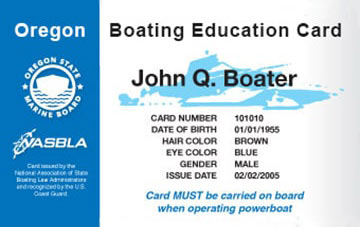
Approved by the
Oregon State Marine Board
Oregon Boating Safety Requirements
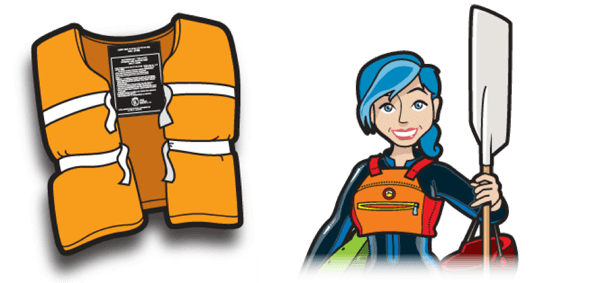
Personal Flotation Devices (PFDs aka Life Jackets)
- The Oregon State Marine Board requires at least one throwable U.S. Coast Guard approved Type IV device (ring buoy OR cushion) on a boat 16 feet or more in length, in ADDITION to a properly fitting, wearable US Coast Guard approved life jacket required for each person onboard all boats.
- Manually propelled canoes and kayaks 16 ft in length and over are exempted from carrying the additional throwable Type IV device.
- Someone being towed behind a boat is considered to be onboard.
- PWC operator and passengers must be wearing their life jackets while underway.
- Inflatable life jackets are not approved to use during high impact sports such as water skiing or operating a PWC.
- Inflatable life jackets are not authorized for use by children under the age of 16. However, some hybrid inflatables have been approved for children.
Children
All children 12 years of age and younger on an open deck or open cockpit, must be wearing their PFD while the vessel is underway or while being towed.
Class III Rapids
All persons operating a boat as well as all passengers in the boat is required to wear an approved and properly fitted U.S. Coast Guard wearable life jacket on all Class III rapids and higher.
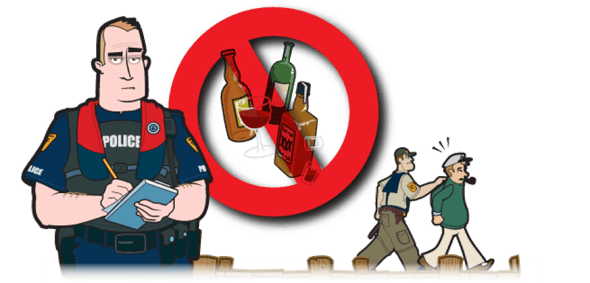
Alcohol & Boating Under the Influence (BUI)
A boater with a blood alcohol content (BAC) of .08% or more is considered to be under the influence. However, a boat operator showing any sign of impairment due to alcohol or drugs is subject to arrest. BUI is a class A misdemeanor punishable by up to one year in prison and a maximum fine of $6,250. If the boater is found guilty of BUI, they will be required to complete a safe boating class, are not allowed to operate a boat for 1 year, and will have all boat registrations in their name suspended for 3 years.
Any person operating a boat on any Oregon waters have given consent to submit to breath and field sobriety tests.

Oregon Boat Registration
All vessels propelled by machinery, including gasoline, diesel and electric motors, and principally operated on Oregon waters must be titled and registered by the OSMB. U.S. Coast Guard documented vessels must also be registered with the Marine Board if classified as a recreational vessel.
Exemptions to the boat registration requirements include:
- Sailboats that are under 12 feet long;
- U.S. Coast Guard documented vessels that are principally used in another state;
- Vessels that are properly registered in another state and that are operating on Oregon waters for no more than 60 consecutive days.
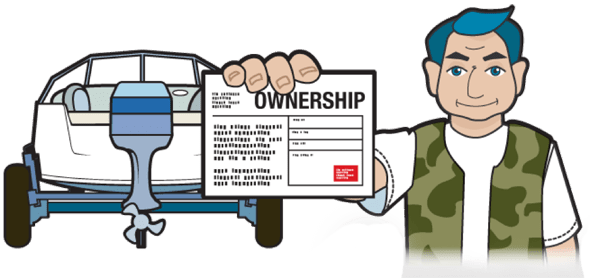
Certificate of Number
Boat owners must have at least a temporary permit before they can operate in Oregon waters. Upon receipt of the Certificate of Number please note the following:
- It must be carried onboard when operating the vessel.
- It is valid for two calendar years and expires on December 31st of the second year.
- The OSMB must be notified within 30 days if the boater changes residences.
The Certificate of Number, validation decals and title are obtained by application to an authorized boat registration agent or to:
Oregon State Marine Board
P.O. Box 14145
Salem, OR 97209-5065
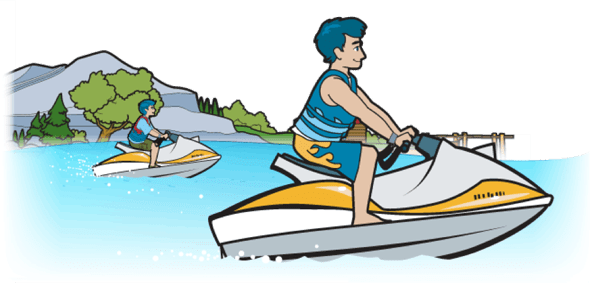
Personal Watercraft Laws & Regulations
Do not underestimate PWCs - they are very powerful for their small size and demand the same respect as any boat. In fact, PWC operation must adhere to the same rules and regulations as any other powerboat - including registration with the state and a B-1 class fire extinguisher aboard.
PWCs have some additional requirements:
- The operator as well as all passengers on a PWC must be wearing an inherently buoyant U.S. Coast Guard approved Type I, II, or III PFD.
- When towing someone on a tube or on water skis, there must be capacity on the PWC to accommodate the operator, the observer as well as the tuber/skier(s).
- PWCs must stay at a distance of 200ft from other water skiers or others being towed behind a vessel.
- PWCs must operate at slow 'no-wake' speed, maximum 5 mph limit when:
- Within 200ft of a swimmer, surfer, diving flag, bank or wading angler, dock, swim float, boat launch, ramp, pier, marina, floating home, moorage area, or boathouse;
- Within 100ft of any vessel that is anchored or un-powered; or
- Within 200ft of shoreline on all lakes, reservoirs, and bays.
- PWC operators in Oregon must not exceed 10mph when approaching within 100ft of a motorized or sailing vessel that is underway.
Hours of Operation
PWCs may be operated at all hours of the day, but must be fitted with the required lights in order to operate legally between sunset and sunrise.
All those operating a PWC in Oregon,
must be at least 16 years old.